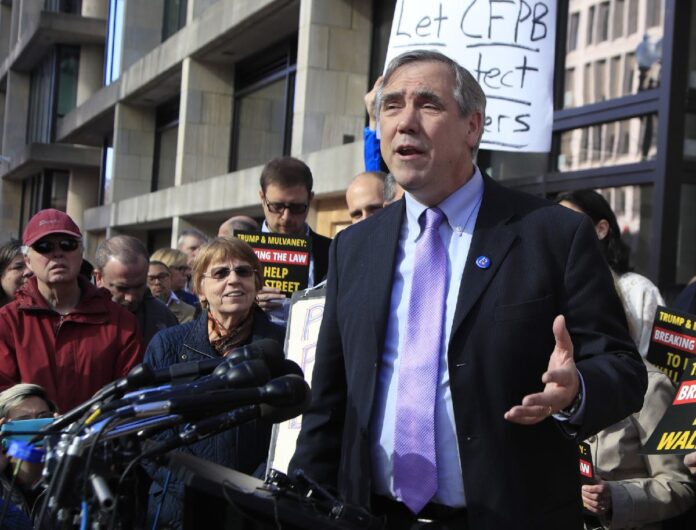A day after having the police called on him when trying to visit an immigration detention center in Brownsville, U.S. Sen. Jeff Merkley, D-OR, called President Trump’s recently implemented “zero tolerance” policy “morally bankrupt.”
Merkley was in the Rio Grande Valley on Sunday to “check in” on the new policy, which the Trump Administration announced earlier this spring to prosecute adults illegally crossing the United States-Mexico border and in doing so, separating any parents from their children.
This practice did not take place before spring. Now, undocumented adults apprehended in the Valley are being taken to federal court in McAllen or Brownsville, where a magistrate judge issues sentences.
Meanwhile, children are being sent to U.S. Department of Health and Human Services facilities in the region, or shipped to other facilities hundreds of miles away.
“The Administration said separating kids from parents was to save kids from smugglers,” Merkley said in a telephone interview Monday. “But that makes no sense.”
The White House disagreed.
“Senator Merkley is irresponsibly spreading blatant lies about routine immigration enforcement while smearing hardworking, dedicated law enforcement officials at ICE and CBP,” White House Deputy Press Secretary Hogan Gidley said in a statement Monday. “He voted against closing the ‘catch-and-release’ loopholes used by child smugglers, and his reckless open border policies are responsible for the permanent separation of thousands of American families who have been forced to bury their loved ones.
“No one is taking a public safety lecture from Sen. Merkley, whose own policies endanger children, em-power human smugglers and drug cartels, and allow violent criminal aliens to flood into American communities.”
On Sunday, Customs and Border Protection gave Merkley a tour of its processing facility in McAllen before the third-term senator visited the Catholic Charities-operated Humanitarian Respite Center in downtown McAllen. He then attempted to tour the Southwest Key Programs detention center in the former Walmart on Padre Island Highway in Brownsville, where local police were called and he was asked to leave the private property shortly afterwards.
That property the old Walmart sits on is contracted from the Office of Refugee Resettlement, an office within HHS. All windows and doors were blacked out, and the parking lot had warnings to not enter.
Before Merkley made his way to the front doors, he introduced the facility on Facebook Live, where he documented the entire experience.
“I want to know if they are having second thoughts about being partners in a process of ripping children away from their families under this new policy,” Merkley said at the beginning of the livestream. “It would seem to me that the very good people that run this non profit and are dedicated to helping children would not wanna be part of an operation of hurting children.”
Merkley said Monday there are reportedly 1,000 children in the old Walmart building.
The scene unfolded quickly, as Merkley, his team and a small contingent of the news media followed him to the front doors, where a telephone number was listed. Merkley called and soon after requested to speak with a supervisor.
Police arrived shortly after to take down his information, and the supervisor exited the building only to tell Merkley to call a Washington, D.C. telephone number. Merkley asked the supervisor and police officers several questions about zero tolerance before the supervisor eventually asked Merkley to leave.
Merkley did not appear skittish nor hostile in the interactions.
“He came to listen,” said Michael Seifert, a border advocacy strategist for the American Civil Liberties Union, who accompanied him throughout the day. “He and his staff said right at the top, ‘we have no idea what’s going on.’ And most importantly, they listened tremendously.”
Seifert was not with Merkley when the senator took his 1-hour tour of the McAllen processing center, which is often closed to members of the public and news media.
“You have a smaller room that has cages made out of fencing material — in my head it reminds me of dog kennels,” Merkley said. “They’re given space blankets, and they’re laying on concrete floors, so a blanket’s not much. It’s something, I suppose.”
Merkley described seeing distressed people, and some crying. He also recalled seeing a large group of boys lining up for food in order of height.
“There was one little tike, head as high as a desk,” Merkley said. “I have no way of knowing his age but I’d guess maybe four or five years old.”
He then went to the respite center. That is where the “absolute best stuff came out of,” Seifert, who translated, said
Merkley and Seifert both recalled meeting a pregnant woman from Central America at the respite center. Merkley asked why she came to the U.S.
“Well,” she said, according to Merkley and Seifert. “I was gang raped. That’s why I left.”




